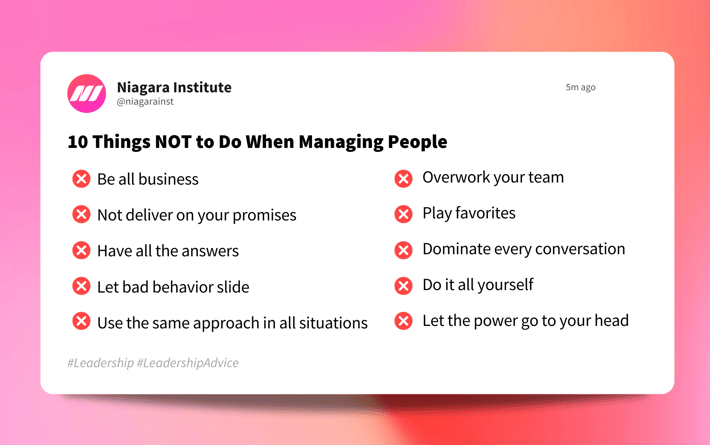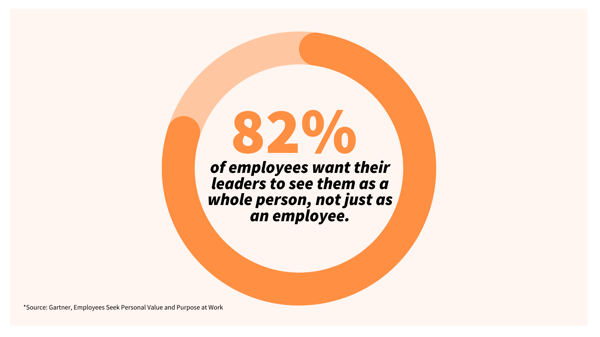11 min read
What is Leadership Training for Managers?
The fact is that managers who receive little to no leadership training and lack the skills they need to lead effectively are costly. Gallup estimates...

You’ve recently received a promotion to a people management role - congratulations! However, as you soon found, managing people requires different skills than what is needed to excel as an individual contributor. Anyone can take on a new title and delegate tasks, but there is much more to being an effective manager than that.
In fact, a 2022 State of the Manager Report uncovered the actual value of a great manager. It found that highly effective managers drive 48% greater profits for their companies than average managers. In addition, during the pandemic, teams with highly effective managers were 21% more likely to feel supported and 15% better than their peer teams in creating new communication norms and routines.
So this begs the question, how do you effectively manage people? Sometimes, the easiest way to understand how to be an effective manager is to first look at what not to do. By knowing and consciously working to avoid common pitfalls those in management can make, you will be taking the first step in becoming the leader your team needs. It will also help you self-assess the skills and develop areas you need to improve. Let’s jump in.

While hitting your goals and delivering on your accountabilities are incredibly important, if you only focus on business when managing people, it can have a detrimental effect on achieving your goals. With 82% of employees agreeing they want to be seen as a whole person by their leader, being only interested in the numbers will inevitably hurt engagement and motivation, reducing productivity and team performance.

When a manager lacks accountability and integrity, failing to follow through on their promises, it breeds resentment, reduces trust and respect, and sets an example for employees that it is acceptable to do the same. People managers won’t be effective if they don’t have personal accountability and definitely won’t be able to hold employees accountable either.
It’s a misconception that when you manage people, you must have all the answers because you’re the leader, the one they trust to navigate the path forward. However, effective managers understand the importance of transparency, vulnerability, and humility. Showing humility that you don’t have all the answers, and frankly, being unapologetically human has been found by the Journal of Management to lead to greater collaboration, team alignment, information sharing, and better decisions.
.png?width=600&height=338&name=Humility%20in%20Leadership%20Leads%20to%20greater%20collaboration%2c%20team%20alignment%2c%20information%20sharing%2c%20and%20better%20decisions.%20(1).png)
While no one enjoys confrontation and conflict, managers who do not confront employees' bad behavior on their team risk promoting a toxic work environment where these behaviors take root and become the team culture. In fact, it was found that 58% of people who left a job due to culture claimed their direct leader was the main reason they ultimately left; thus, the importance of stopping negative behaviors for the sake of the team culture cannot be underestimated.
Everyone who leads a group has a leadership style they naturally gravitate towards. However, not all situations require the same leadership style, and if you only use one style, you won’t be an effective manager. Being self-aware of your preferred style, when it is best used, and what other style may be better for the situation is critical to knowing how to manage people.
Quiet quitting or bare-minimum Monday are new terms referring to employees rejecting managers and organizations obsessed with productivity and chronically overworking their employees. Overworking has been shown to increase the likelihood of burnout and turnover and reduce engagement and productivity, making it a terrible way to manage people.
When you have a star performer on your team, it may be hard not to give them preferential treatment. However, to be an effective people manager that keeps their entire team engaged and motivated, you must be mindful of not demonstrating favoritism, which may be easier said than done. Unfortunately, it’s a real problem, with 47% of employees reporting that their supervisors had favorites, making favoritism at work a standard management issue most leaders need to overcome.
.png?width=600&height=338&name=47%25%20of%20employees%20reported%20that%20their%20supervisor%20had%20favorites%20(1).png)
Poor communication skills can plague many managers, and one place it shows up is when a people leader dominates every conversation with their team members. A study that looked at leaders who do all the talking vs. leaders who prefer listening uncovered that leaders who were listeners were rated significantly more effective on 13 out of 16 critical leadership competencies than their talkative peers.
With goals to achieve and targets to hit, many managers unintentionally take on work they should be delegating. SHRM found the top reasons managers resist delegating as they believe that employees cannot do the job as well, it takes more time to delegate than do the work itself, and they lack trust in their employees. Yet, for employees to be engaged, productive, and motivated, they need a manager who believes in them, coaches and develops them, and trusts them, which all can be demonstrated by actually delegating work.
There is a phenomenon called “the power paradox” in the corporate world, where management promotions and new power dynamics change people. Dacher Keltner noted this in his HBR article, “While people usually gain power through traits and actions that advance the interests of others, such as empathy, collaboration, openness, fairness, and sharing; when they start to feel powerful or enjoy a position of privilege, those qualities begin to fade.”
He goes on to share that “Studies show that people in positions of corporate power are three times as likely as those at the lower rungs of the ladder to interrupt coworkers, multitask during meetings, raise their voices, and say insulting things at the office.” Given this, it is critical to be self-aware and put your ego in check.
.png)
11 min read
The fact is that managers who receive little to no leadership training and lack the skills they need to lead effectively are costly. Gallup estimates...

5 min read
The events of the last few years have reshaped how we work, accelerated trends, and increased expectations of leaders and companies, putting pressure...
.png)
4 min read
Let’s say you have a highly ambitious and accountable employee with a proven track record of delivering projects on time. This employee typically has...